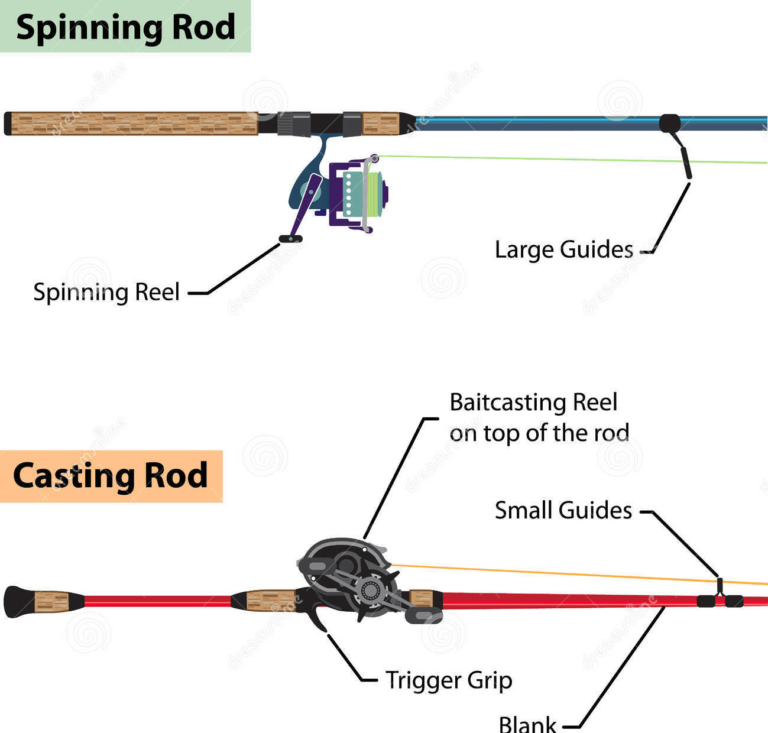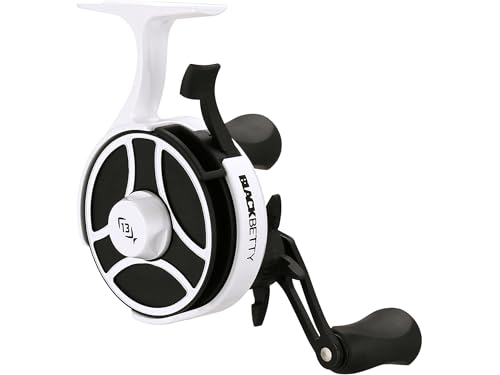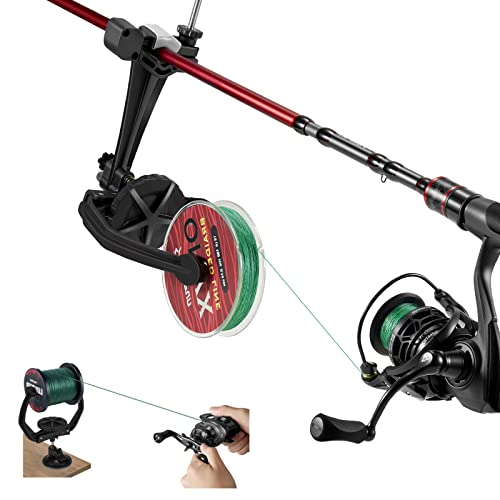A baitcasting rod is designed for casting heavier lures and provides better accuracy and control, while a casting rod is more versatile and suitable for various fishing techniques and lighter lures. When choosing between the two, consider your fishing style and target species.
Now let’s dive into a more detailed comparison. Baitcasting rods and casting rods are two popular options for anglers, each with its own advantages and best use-cases. Understanding the differences between them can help you make an informed decision when selecting the right rod for your fishing needs.
Baitcasting rods are specifically designed for casting heavier lures, such as crankbaits and jigs, with precision and accuracy. They are equipped with a reel mounted on top of the rod, allowing for better control and line management. Baitcasting rods typically feature stronger backbones and stiffer actions, enabling anglers to exert more power when fighting big fish. On the other hand, casting rods are more versatile and suitable for various fishing techniques, including casting and trolling. They are typically more forgiving, making them a better option for anglers who are still refining their casting skills. Casting rods come in different lengths, weights, and actions, catering to a wide range of fishing scenarios. Ultimately, the choice between a baitcasting rod and a casting rod depends on your fishing style and the type of fish you intend to catch. Consider factors such as lure weight, casting distance, accuracy, and your level of experience to make the right decision.

Credit: adayscatch.com
The Advantages And Disadvantages Of Baitcasting Rods
Discussing The Unique Features And Benefits Of Baitcasting Rods
Baitcasting rods are a popular choice among experienced anglers due to their unique features and benefits. They offer increased accuracy and control for precision casting, making them highly suitable for various fishing techniques. In this section, we will delve into the advantages and disadvantages of baitcasting rods, giving you a comprehensive understanding of their worth.
Increased Accuracy And Control For Precision Casting
One of the primary advantages of using a baitcasting rod is the enhanced accuracy and control it provides. With a baitcasting setup, anglers have better control over the speed and distance of their casts. The ability to adjust the reel’s drag, spool tension, and braking system enables precise lure placement, especially in tight spots or around obstacles.
This makes baitcasting rods particularly useful for targeting specific fish species or in scenarios where accuracy is paramount.
Benefits of increased accuracy and control for precision casting:
- Accurate lure placement: Baitcasting rods allow anglers to precisely place their lures in specific areas, increasing the chances of attracting and hooking fish.
- Targeting hard-to-reach spots: With their superior control, baitcasting rods enable anglers to cast into tight spaces or around cover, where fish are more likely to be hiding.
- Long-distance casts: The adjustable settings on baitcasting reels allow for longer casts, reaching fish that may be located farther away.
Suitable For Heavy Lures And Lines
Another advantage of baitcasting rods is their ability to handle heavier lures and lines. Due to their design and construction, baitcasting rods can handle more substantial weights and resist the strain placed on them. This makes them ideal for targeting larger fish species and fishing in heavier cover or rough conditions.
Benefits of using baitcasting rods with heavy lures and lines:
- Targeting big fish: Baitcasting rods are capable of handling heavier lures and lines, making them suitable for pursuing larger game fish.
- Fishing in heavy cover: With their durability and strength, baitcasting rods are effective in fishing around heavy cover, such as vegetation or underwater structures.
- Handling rough conditions: The robust construction of baitcasting rods makes them more resilient to harsh weather or water conditions, ensuring they can withstand the pressure.
Ideal For Experienced Anglers
While baitcasting rods offer several advantages, it’s worth noting that they are better suited for experienced anglers. The intricacies involved in properly operating a baitcasting setup require a certain level of skill and technique. Beginners may find the learning curve steeper compared to other rod types, and it may take some time to master the art of casting without experiencing backlashes or tangles.
Drawbacks of baitcasting rods for beginners:
- Steeper learning curve: Operating a baitcasting rod requires practice and precision, which can be challenging for beginners. Learning to properly manage the reel’s braking system and spool tension may take time.
- Potential for backlashes and tangles: If not used correctly, baitcasting reels can experience backlashes and tangles, resulting in frustration for anglers. This can occur when the spool spins faster than the line can be retrieved, causing a backlash of tangled line.
Baitcasting rods offer increased accuracy, control, and the ability to handle heavy lures and lines, making them a preferred choice for experienced anglers. However, beginners should be aware of the steeper learning curve and the potential for backlashes and tangles.
With practice, patience, and proper technique, anglers can fully utilize the benefits of baitcasting rods in their pursuit of trophy fish.
The Advantages And Disadvantages Of Casting Rods
Baitcasting Rod Vs Casting Rod
When it comes to choosing the right fishing rod, many anglers find themselves torn between a baitcasting rod and a casting rod. Both options have their own set of advantages and disadvantages, making it crucial to understand the differences before making a decision.
In this section, we will delve into the advantages and disadvantages of casting rods, shedding light on why they may be the perfect fit for some anglers while falling short for others.
Exploring The Advantages Of Casting Rods
Casting rods offer a range of benefits that make them a popular choice among anglers. Let’s take a closer look at these advantages:
- Versatility for various fishing techniques and environments: Casting rods are incredibly versatile, allowing anglers to tackle different fishing techniques such as flipping, pitching, and punching, among others. Whether you’re targeting bass in freshwater or battling larger saltwater species, a casting rod can be tailored to suit your specific needs.
- Easier to use for beginners: If you’re new to fishing or still developing your skills, a casting rod can be a great starting point. Unlike baitcasting rods, casting rods are generally more forgiving and easier to handle. The intuitive design and straightforward mechanics make them a reliable choice for beginners looking to master their casting technique.
- Less susceptible to backlashes: Backlashes, those dreaded snarls of fishing line, can quickly turn a good fishing day into a frustrating one. Casting rods, with their closed-face reels or spinning reels, are less prone to backlashes compared to baitcasting rods. This feature not only minimizes tangles but also allows for smoother casting and retrieval.
Examining The Limitations Of Casting Rods
While casting rods offer several advantages, it’s essential to be aware of their limitations. Here are a few aspects to consider:
- Limited accuracy and control compared to baitcasting rods: When it comes to precision casting and fine-tuning your presentation, baitcasting rods tend to outshine casting rods. The design of casting rods may limit your ability to cast with pinpoint accuracy, especially when targeting small or distant targets. If casting accuracy is crucial to your fishing style, a baitcasting rod might be a better choice.
- May not handle heavy lures and lines as effectively: Casting rods may struggle when it comes to handling heavier lures and lines. In situations where you need to cast heavy lures or lure combinations, such as thick cover or deep water fishing, a baitcasting rod’s superior strength and power will give you more control and reliability.
Casting rods provide versatility, ease of use for beginners, and a reduced risk of backlashes. However, their limitations in terms of casting accuracy and handling heavy lures and lines must be taken into account. By considering your fishing technique, target species, and environment, you can make an informed decision on whether a casting rod is the right choice for your angling pursuits.
So, weigh the pros and cons carefully, and find the perfect rod that will enhance your fishing adventures.
Factors To Consider When Choosing Between Baitcasting And Casting Rods
When it comes to choosing between baitcasting and casting rods, there are several factors to take into consideration. By evaluating your individual fishing style and preferences, target species and fishing techniques, experience level and skill set, as well as your budget and affordability, you can make an informed decision that will enhance your overall fishing experience.
Let’s delve into each factor and explore how they should impact your rod selection process.
Discussing The Importance Of Considering Individual Fishing Style And Preferences
- Your fishing style and preferences play a significant role in determining the type of rod that suits you best. Consider the following key points:
- Baitcasting rods are ideal for those who enjoy precision casting and want more control over lure placement.
- Casting rods are better suited for anglers who prefer long casting distances and want to cover a larger area.
- Understanding your personal fishing style and the techniques you enjoy will help you choose the right rod for you.
Exploring The Target Species And Fishing Techniques
- The target species you plan to pursue and the fishing techniques you use should also be factored into your choice between baitcasting and casting rods:
- Baitcasting rods are popular among anglers targeting larger, heavier fish species such as bass, pike, or musky as they provide more power and strength.
- Casting rods are versatile options suitable for various fishing techniques, including spinnerbait fishing, trolling, and bottom fishing.
- Take into account the species you commonly fish for and the techniques you employ to ensure your rod is well-suited to your fishing endeavors.
Addressing The Angler’S Experience Level And Skill Set
- Your experience level and skill set as an angler should not be ignored when selecting a rod. Here are some points to consider:
- Baitcasting rods require more skill and finesse to operate due to their specialized design, making them generally better suited for experienced anglers.
- Casting rods, on the other hand, are often recommended for beginners as they are easier to handle and provide more forgiveness in casting techniques.
- Assess your own experience level and comfort with different rod types to make an appropriate choice that matches your skills.
Highlighting The Importance Of Budget And Affordability
- Finally, budget and affordability are crucial factors that can influence your decision between baitcasting and casting rods:
- Baitcasting rods tend to be more expensive compared to casting rods due to their specialized design and added features.
- Casting rods usually offer a more cost-effective option for anglers looking for a versatile rod without breaking the bank.
- Consider how much you are willing to invest in your rod while also ensuring it meets your specific fishing needs.
By considering your fishing style and preferences, target species and fishing techniques, experience level and skill set, as well as your budget and affordability, you can confidently choose between baitcasting and casting rods. Selecting the right rod will enhance your fishing performance and overall enjoyment on the water.
Personal Insights And Recommendations
Baitcasting Rod Vs Casting Rod: Personal Insights And Recommendations
If you’re an avid angler, you’ve likely come across the debate of baitcasting rods versus casting rods. While both types of rods serve their purpose in different fishing situations, understanding their key differences can help you make an informed decision.
In this section, we’ll provide personal insights on using both baitcasting rods and casting rods, offer recommendations based on specific fishing situations and preferences, and encourage you to experiment and try both rod types to determine your own preferences.
Providing Personal Insights On Using Both Baitcasting Rods And Casting Rods
- Baitcasting rods require some practice to master the art of casting, but once you’ve got the hang of it, they offer increased accuracy and control.
- These rods are ideal for situations that require precise cast placement, such as fishing in heavy cover or targeting specific spots.
- Baitcasting rods provide better line control and are capable of handling heavier lines and lures, making them a preferred choice for anglers targeting larger game fish.
- However, beginners may find baitcasting rods challenging due to the learning curve and potential for backlash, which occurs when the reel spool starts spinning faster than the line can be released.
Offering Recommendations Based On Specific Fishing Situations And Preferences
- If you’re a beginner or prefer a more straightforward casting experience, casting rods may be the better option. These rods are easier to use and require less skill to cast efficiently.
- Casting rods excel in situations that don’t demand pinpoint accuracy, such as casting in open water or fishing for smaller species.
- Anglers who enjoy finesse techniques, such as drop shotting or finesse jigging, often lean towards casting rods due to their sensitivity and lighter weight.
- It’s essential to consider your fishing style, target species, and the specific conditions you’ll be fishing in when choosing between baitcasting and casting rods.
Encouraging Readers To Experiment And Determine Their Own Preferences
Ultimately, there’s no one-size-fits-all answer when it comes to choosing between baitcasting rods and casting rods. Personal preferences, fishing techniques, and the specific needs of each angler play a significant role in the decision-making process. To find the perfect rod for your needs, we encourage you to experiment with both baitcasting and casting rods.
Consider borrowing or renting different rod types, trying them out in various fishing situations, and paying attention to how each rod feels in your hands. By doing so, you’ll be able to make an informed decision based on your personal preferences and fishing style.
Remember, whether you prefer the accuracy of a baitcasting rod or the simplicity of a casting rod, the most important thing is to enjoy the art of fishing and the excitement of reeling in your catch. So go out there, cast away, and discover the rod type that suits you best!
Conclusion
After comparing the baitcasting rod and casting rod, it is clear that both have their strengths and weaknesses. The baitcasting rod is a popular choice for experienced anglers who require precise casting and control. It offers greater accuracy and the ability to handle heavy lines and lures.
On the other hand, the casting rod is more forgiving and easier to use for beginners. It provides longer casting distance and better line control. Ultimately, the choice between the two types of rods depends on individual preferences and fishing styles.
Whichever rod you choose, it is important to practice and familiarize yourself with its features to maximize your fishing experience. Whether you are targeting large game fish or fishing in freshwater or saltwater, having the right rod can significantly improve your chances of success.
So, take the time to choose the rod that suits your needs and get ready for that perfect catch.



